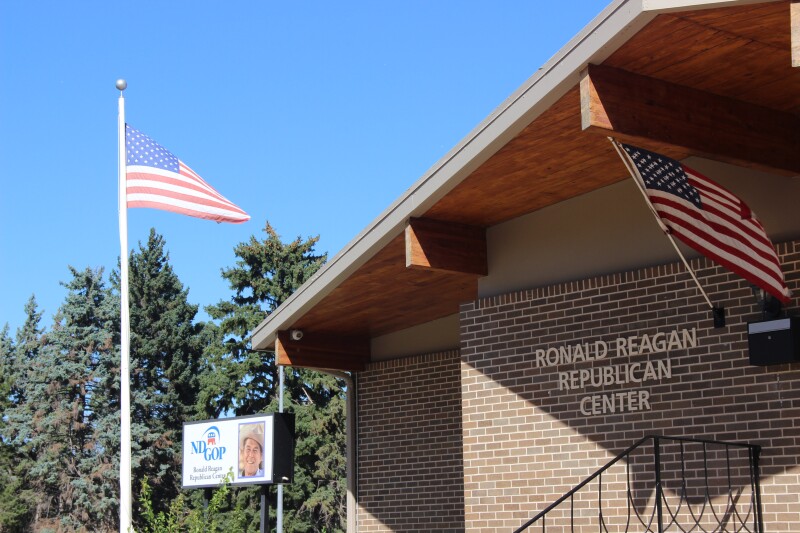Politics
North Dakota GOP Faces Turmoil Over Legislative Vacancy Dispute

The internal conflict within the North Dakota Republican Party (NDGOP) intensifies as the resignation of State Representative Emily O’Brien opens a new chapter of discord in Grand Forks-area District 42. O’Brien, a moderate Republican, stepped down last month to accept a position in Governor Kelly Armstrong‘s administration. Her departure has exacerbated existing tensions between traditional conservatives and a rising populist faction within the party.
According to state law, the political party representing the vacated legislative seat holds the authority to appoint a replacement. Traditionally, this process has been straightforward. However, the political landscape has shifted dramatically in recent years, particularly during the Trump era, complicating these appointments. The situation in Wahpeton-area District 25 serves as a notable example, where infighting hindered local Republicans from electing district leaders, culminating in a vacancy following the death of Representative Cindy Schreiber-Beck.
The chaos within District 42 has led to a pushback from two district members, Derrick Sherwood and another unnamed member, who filed a “cease and desist” memo with district leadership. They accuse Chair Kimmy Efta of obstructing efforts to initiate the appointment process following O’Brien’s resignation. Sherwood took to social media, urging supporters to “stay enraged” over leadership decisions. Key allegations against Efta include missing meetings, failing to convene an emergency session to address the vacancy, and attempting to manipulate outcomes by allowing same-day membership payments with immediate voting rights while limiting public access.
The factional struggle is emblematic of wider challenges facing the NDGOP, particularly as a recent law prohibits the state party from managing district affairs. This statute has made it difficult for the NDGOP to navigate local conflicts, further complicating the appointment process. The memo filed by Sherwood and his colleague highlights that Efta’s engagement with the state party constitutes a breach of this law.
In response to the accusations, Efta clarified that the committee only received official notification of O’Brien’s vacancy on September 2, 2023. This notice triggers a 21-day timeline for the committee to appoint a successor, after which the Legislative Management can make an appointment. Efta noted that this timeline shifts the context of the complaints about the lack of meetings.
Addressing the allegations of manipulating district bylaws, Efta asserted that the committee is following the existing rules as they stood at the time of O’Brien’s resignation. She stated, “The day Emily resigned from her position, we are using the bylaws from then.” Efta explained that the claims regarding her absence from meetings are based on her voluntary role on a committee chaired by Sherwood and that her recent health issues, including a diagnosis of breast cancer, had affected her attendance.
Efta’s refusal to convene an emergency meeting, as requested by Sherwood and others, was grounded in party bylaws, which require a minimum of five district members to sign a request for such a meeting. The notice for any scheduled meeting also requires a ten-day advance notification, which Efta maintained had not been met in the requests made by Sherwood.
The claims of disenfranchisement regarding new members participating in the process were also addressed by Efta. She emphasized that current bylaws permit any dues-paying member to vote, as there are no deadlines stipulated in the rules. Efta further refuted the notion that the NDGOP had improperly intervened in district matters, stating that her communication with the state party was about procedural clarity rather than interference.
The ongoing turmoil within the NDGOP is underscored by a broader narrative of division within the party. In a notable instance of political fallout, the NDGOP censured its own recently elected governor earlier this year, further illustrating the challenges facing party unity. Efta’s commitment to following the laws and rules governing the appointment process has brought her into the crosshairs of party dissenters, leading her to express frustration over the attacks aimed at her leadership.
As the situation unfolds, the dynamics within the NDGOP remain precarious. The tensions in District 42 reflect a larger struggle between traditional Republican values and the populist movements reshaping the party’s landscape. Observers will be watching closely as the appointment process progresses and whether the internal divisions can be reconciled in the face of increasing scrutiny and dissent.
-

 Lifestyle3 months ago
Lifestyle3 months agoLibraries Challenge Rising E-Book Costs Amid Growing Demand
-

 Sports3 months ago
Sports3 months agoTyreek Hill Responds to Tua Tagovailoa’s Comments on Team Dynamics
-

 Sports3 months ago
Sports3 months agoLiverpool Secures Agreement to Sign Young Striker Will Wright
-

 Lifestyle3 months ago
Lifestyle3 months agoSave Your Split Tomatoes: Expert Tips for Gardeners
-

 Lifestyle3 months ago
Lifestyle3 months agoPrincess Beatrice’s Daughter Athena Joins Siblings at London Parade
-

 World3 months ago
World3 months agoWinter Storms Lash New South Wales with Snow, Flood Risks
-

 Science3 months ago
Science3 months agoTrump Administration Moves to Repeal Key Climate Regulation
-

 Science2 months ago
Science2 months agoSan Francisco Hosts Unique Contest to Identify “Performative Males”
-

 Business3 months ago
Business3 months agoSoFi Technologies Shares Slip 2% Following Insider Stock Sale
-

 Science3 months ago
Science3 months agoNew Tool Reveals Link Between Horse Coat Condition and Parasites
-

 Sports3 months ago
Sports3 months agoElon Musk Sculpture Travels From Utah to Yosemite National Park
-

 Science3 months ago
Science3 months agoNew Study Confirms Humans Transported Stonehenge Bluestones









